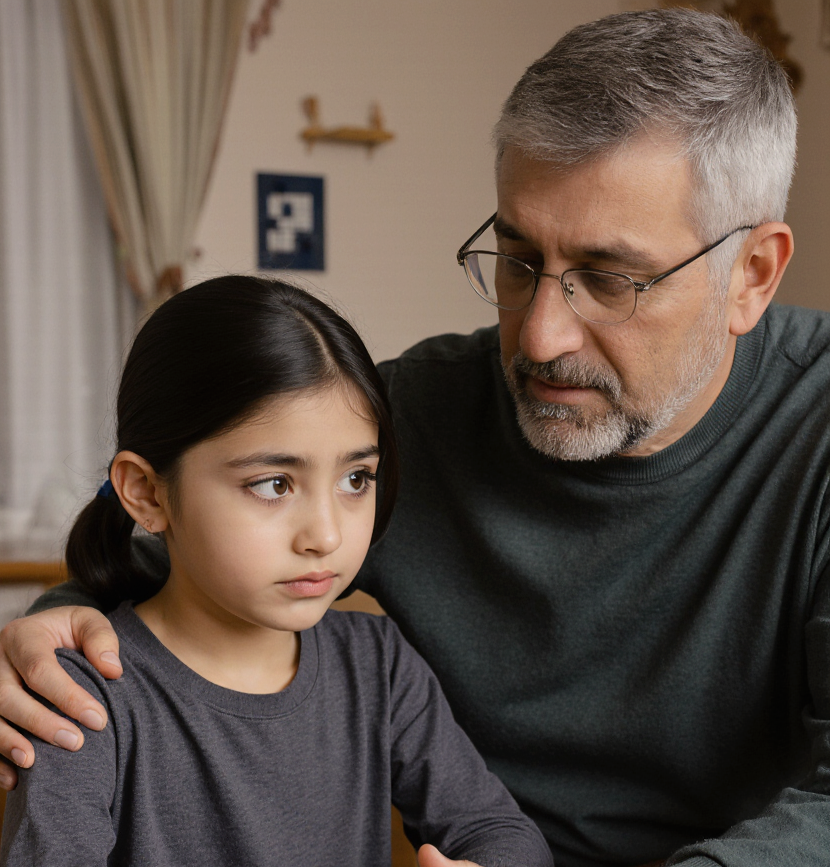The second incident shattered the illusions that remained. What Daniil had believed about Sonya was just a fragment of the truth. She was neither a victim nor a passive bystander.
Sonya acted as a protector for others—without loud protests, complaints, or tears. She faced it all quietly, yet with unwavering dignity.
“Enough. Leave him alone. This is the second time,” her voice rang with confidence.
“He started it,” one of the boys responded.
“That’s no reason to attack. Step aside.”
A rustle, some bustle, a relieved exhale—and then a grateful whisper:
“Thank you…”
“Better me than you. Go to class,” Sonya whispered softly.
Daniil was left speechless, breath caught in his throat. His quiet, thoughtful daughter was daily standing between the ones suffering and those who inflicted pain. Taking blows herself to shield others.
At that moment, he understood: this was no accident. It was her very nature. Memories of his late wife, Alina, surfaced—she had once told their little daughter:
“If someone is hurting, be the one who notices. Just be there.”
Sonya carried those words in her heart. Even in kindergarten, she comforted a boy whose teddy bear fell into a stream. By second grade, she stood up for a girl struggling with stuttering. She had always noticed those whom others chose to ignore.
Now Daniil clearly saw how deeply this trait had matured in her. Sonya had a circle of children who looked up to her. One Friday evening, he observed her walking home with companions—a boy named Egor and girls named Masha and Natasha. They paused near a bench outside the school, pulling out notebooks and discussing something intently.
Later, he discovered Sonya’s diary:
- “How to help Dima feel safe during recess”
- “Who will stay with Anya when she’s sad”
- “Talk to Artyom so he stops being afraid to answer in class”
This was far more than kindness—it embodied a deliberate, purposeful mission. A life devoted to caring.
Daniil approached the school principal, Irina Vladimirovna—a stern, meticulous woman clearly weary from endless parental complaints.
“There’s a problem at school,” he began.
“Well, you know, children are different,” she interrupted. “There are no official reports of bullying here.”
“My daughter has bruises because she defends those who are ridiculed every day. This is no exaggeration. It’s the truth.”
“Maybe she’s too sensitive,” she shrugged.
Daniil left the office burning with anger but determined: he would no longer stay on the sidelines. Action was necessary.
Days later, a note appeared in the mailbox, written in uncertain, childish writing:
“Your daughter is the bravest person I know. When I was locked in the closet, I thought nobody would come. But she came. Opened the door. Said, ‘Let’s go home.’ Now I’m not afraid of the dark, because I know she’s there.”
Unsigned, except for a drawn-open palm.
That evening, Daniil showed the letter to Sonya. She was silent for a long time, her eyes shimmering. She held the note so gently, as if afraid to lose it.
“Sometimes it feels like all this is in vain… that no one notices,” she whispered.
He stepped closer, voice trembling with pride:
“It matters, Sonya. More than you realize. It always has.”
The very next day, Sonya was invited to speak at the school assembly. She agreed—on one condition: everyone standing by her side would join her on stage.
“We’re not heroes,” she said. “We just stand beside each other when it’s scary. If someone cries, we stay. If someone can’t speak, we speak for them. That’s all.”
The auditorium fell silent, then erupted into applause. Teachers, students, parents—even the most indifferent listeners hung on every word. The wall of silence began to crumble.
School hallways filled with anonymous notes bearing a simple word: “Thank you.” Students volunteered to become kindness observers. Daniil gathered a group of parents whose children had also transformed, though they couldn’t yet name what had changed.
One thing was clear: silence was no longer an option.
In the evenings, these parents met—sometimes at someone’s home, sometimes via video calls—to share stories, fears, and hopes.
Sonya did not seek the spotlight or rewards. Her gaze remained fixed on those still struggling to believe in the light.
Key Insight: True bravery lies in standing quietly between pain and healing, choosing protection over passivity.
In conclusion, Sonya’s story reveals profound lessons about compassion’s transformative strength. Her unwavering commitment to defend the vulnerable teaches us that courage often manifests not through loud declarations, but through silent, dignified acts of kindness. Her journey inspires a community to break the silence, embrace empathy, and foster a safer, more inclusive environment.
